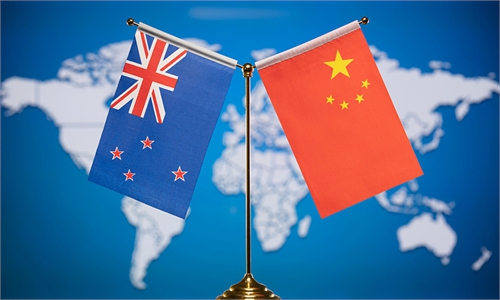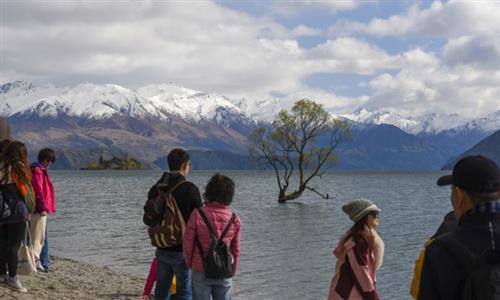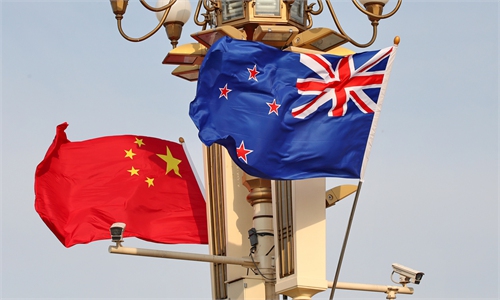
New Zealand National Party leader and Prime Minister-elect Christopher Luxon (second right) comments to media in Auckland, on October 15, 2023, following his victory in a national election. Photo: VCG
The opposition National Party has won the New Zealand election, taking enough seats to form a coalition with its allies on the right wing of politics after six years of Labor government, toward which Chinese experts expressed mixed views in terms of the country's future China policy.
Some experts believe that the new coalition governments' foreign policy, including on China, will be relatively stable even if some discord emerges. But some pointed out that the coalition is likely to make significant adjustments to its predecessor Labor's foreign and security policies, in particular with regard to strengthening foreign and military security policy in closer coordination with traditional allies such as the US, UK and Australia.
But they both called on the next New Zealand government to remain pragmatic and far-sighted in developing China relations.
According to Australian media outlet ABC News, Conservative former businessman Christopher Luxon will be New Zealand's next prime minister after his National Party won a decisive election victory on Saturday.
The exact makeup of Luxon's government is still to be determined as ballots continued to be counted.
With all the regular votes counted, Luxon's National Party had 39 percent of the vote. Under New Zealand's proportional voting system, Luxon, 53, plans to form an alliance with the libertarian Act Party, ABC reported.
There are still thousands of special votes to be tallied, which account for about 20 percent of the total, ABC noted.
Chen Hong, professor and director of the New Zealand Studies Center at East China Normal University, told the Global Times on Sunday that considering the past remarks by Luxon and the words and deeds by the National Party, the center-right party's stance on China is expected to be stable without showing a big fluctuation, and the new government is likely to retain a stance of regarding China as an important economic partner.
Chen noted that during the election campaign, foreign policies including that toward China were not major topics as domestic issues were to the fore.
According to media reports, a National-Act coalition would only have a slim majority, meaning Luxon may need to secure the support of NZ First, a party which vowed to reduce immigration and retain the ban on foreigners buying houses.
It is likely to trigger a heightened sense of alert from foreign communities, especially the Chinese community in New Zealand as NZ First, which was projected to win eight seats, is anti-immigration, Chen said.
At the same time, Chen warned that if the right-wing Act Party joins the coalition, the party could repeatedly hype China-related issues and remain tough on those issues, while trying to promote New Zealand's participation in AUKUS, and the enhance security partnerships among Australia, the UK and the US.
Although the National Party could remain positive on China policy and promote cooperation with China on infrastructure, some discord is likely to appear in the coalition, Chen noted.
However, Yu Lei, chief research fellow at the Research Center for Pacific Island Countries of Liaocheng University, predicted that the coalition might make a significant adjustment to Labor's foreign and security policies.
In recent years, the rise of populism and right-wing political trends in major Western countries has profoundly affected the political landscape of Western countries, and New Zealand cannot be immune to such trends, Yu told the Global Times on Sunday.
The South Pacific nation is likely to adopt stricter security reviews and veto on Chinese telecommunications companies and Chinese investment access, Yu believes.
"The new government may use this as a pretext to strengthen relations with the US and a litmus test to test China's bottom line," Yu warned. In any case, the result will be a backlash, similar to the discontent in Australia as Canberra's restrictions and veto measures against China were counterproductive, Yu noted.
"In view of the breadth and depth of mutually beneficial economic and trade cooperation between China and New Zealand, New Zealand's export commodities have a high degree of homogeneous competition with the US and Australia, so the new government will be cautious on the issue of bilateral relations," Yu said.




